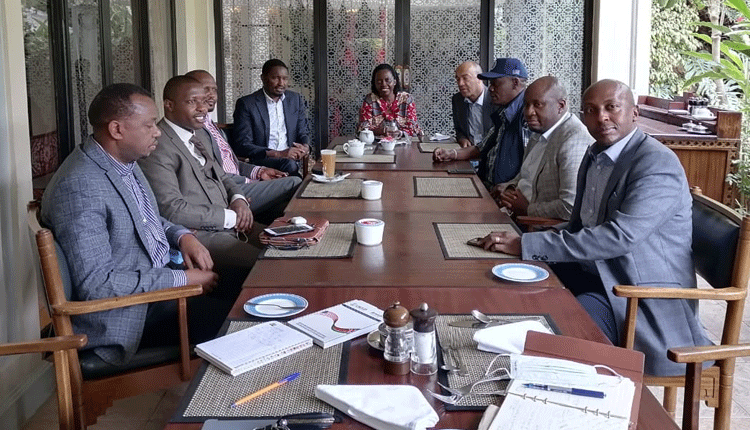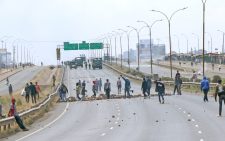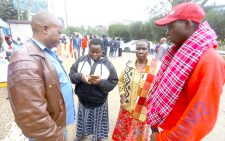Building Bridges Initiative collapse now haunts Mount Kenya

Collapse of the Building Bridges Initiative (BBI) is fast growing into a key campaign issue, that could be a critical determinant of the outcome of next year’s General Election.
While ODM leader Raila Odinga appears keen to use his effort to unlock allocation of more funds to the grassroots as a critical plank in his campaign, Deputy President (DP) William Ruto maintains that the law reform initiative was calculated to frustrate his presidential ambitions by creating key posts for his opponents.
The BBI proposed expansion of the Executive to create the post of prime minister with two deputies, raise funds allocation to counties to 35 per cent from the current 15 per cent, create a ward fund, give tax breaks to small businesses and create additional constituencies for some regions, among other benefits.
Political mistake
Barely three weeks since the collapse of the BBI case at the Court of Appeal, Raila has picked up the campaign, blaming Ruto for rejection of an initiative, that could have seen more allocation of cash to populous regions in Mount Kenya and Maa speaking counties which the two are fighting to woo ahead of the election.
The issue is fast becoming a hot potato in Mt Kenya region, triggering renewed efforts by a section of local leaders keen to salvage some BBI benefits through Parliament.
Had the initiative progressed, Mt Kenya region was set to be the biggest beneficiary through huge funds allocations to its populous counties which its leaders have been championing under the one-man-one-vote-one-shilling clarion.
And debate rages, those on the spot include local MPs allied to Ruto who rallied against the initiative spear-headed by President Uhuru Kenyatta and Raila.
“We have lost Sh53 billion annually that would have gone to Mt Kenya counties.
We have lost nearly 30 additional constituencies and the seven existing constituencies which do not meet the IEBC population threshold but were protected under the BBI now stand the risk of being scrapped,” lamented Ndaragwa MP Jeremiah Kioni.
“The reality has started sinking in amongst our people who feel that that they have lost benefits that would have come with the BBI.
Our people who do business could have benefited from tax holidays; our children will miss bursaries; we missed an opportunity to jumpstart our economy,” said the MP who chairs the National Assembly Committee on Implementation of the Constitution.
Kioni said that members of the committee are holed up in Mombasa, fine-tuning Bills meant to enact some of the BBI proposals, especially on resource allocation, creation of constituencies and structure of the Executive.
“The biggest political mistake was to lie to the people of Central Kenya that the BBI project was meant to fight the DP and benefit Raila.
It will be very expensive politically for those who propagated the lie. In the conversations we are having with the people after the Appeal Court ruling, people feel cheated,” he said.
Kioni said Kenyans must be able to change the Constitution using peaceful means otherwise some people would feel disgruntled.
The committee has indicated that it was keen to re-route some of the BBI proposals through Parliament, the popular initiative having hit a wall.
“We may have lost the document but our problems remain. We must address unfair distribution of resources, the one-man vote issues and violence during elections.
The problems will not be defeated by the loss in the Court of Appeal,” he said.
The Independent Electoral and Boundaries Commission warned in June that nearly 26 constituencies could be scrapped after it reviewed the population threshold from 133,000 to 164,000.
Legal mechanism
The BBI taskforce had ruled out a proposal to reduce the number of constituencies.
They proposed that all existing 290 constituencies will be retained, including the protected seats as they have become key for representation of sparsely populated areas.
With the collapse of the BBI, a legal mechanism will have to be explored to protect the affected electoral areas.
They include Tetu, Kioni’s Ndaragwa, Mukurweini, Othaya, Kangema, Mathioya and Siakago in the Mt Kenya region.
Others are Bura, Galore, Isiolo South, Kilome, Laisamis, North Horr, Saku, Mbeere North, Lamu East and Lamu West.
Mvita, Mwatate, Wundanyi, Voi, Samburu East, Marakwet East, Keiyo North, Mogotio, Vihiga, and Budalang’i are also at risk of losing their status.
Gatundu South MP Moses Kuria, Narc Kenya leader Martha Karua, former Kiambu Governor William Kabogo and former Gatanga MP Peter Kenneth, have indicated that they will hold a meeting of Central Kenya leaders on Monday to discuss the future of the region post-BBI.
Ruto and his allies are being accused of duping central Kenya politicians to reject allocation of resources to their areas.
“The DP and allies will have to build another narrative to counter growing debate that he spearheaded rejection of more cash to Mt Kenya,” argues Sharif-Peter Mogire, a political analyst.
He added: “It might end up as a valuable vote- hunting tool for Raila who is likely to market himself as a friend of Mt Kenya through the BBI.”
Ruto, who strongly believes that the initiative was calculated to frustrate his presidential ambitions, took to social media to celebrate the collapse of the BBI.
According to Kuria, he and Karua will co-chair a session to discuss ways of salvaging some BBI proposals, especially those touching on resource allocation and representation.
Waged war
Kuria, the leader of the Chama Cha Kazi, on Monday said that as Mount Kenya leaders they are concerned about issues of equity in distribution of resources and constituencies now that BBI is dead.
Incidentally, Karua was among the country’s top lawyers who waged war against the initiative at appeal court.
Kuria, who was among the key BBI opponents, has been instrumental in spearheading the “One-vote-one shilling” call which seeks to have counties allocated resources according to their population.
He has singled out Kiambu and Nakuru counties which he claims were under funded despite of their huge populations.
But Law society of Kenya President Nelson Havi who represented the BBI opponents in court said the initiative cannot be salvaged.
“Changes to the Executive and boundaries will be touching on the basic structure and for this to happen there must be certain consequences as spelt out by the judges.
Anybody who listened to the Appeal Court judgment would know that the Constitution places a permanent roadblock in that direction,” he told People Daily yesterday.
“The Constitution can only be changed when the whole public experiences a constitutional moment and that has not happened. BBI is dead.”
Reacting to the Appeal Court decision, Uhur said short-term political interests stood in the way of an initiative which he believes would have helped address some of the country’s pressing challenges, notably divisive elections and inequality in distribution of resources.
“I believe we have denied Kenyans their resources. We have denied Kenyans equity. We have denied them funds that would have gone to mashinani (grassroots) through a ward fund, which, to me, is actually a much more equitable way of ensuring a child from the grassroots is able to receive education to university instead of relying only on the Constituency Development Fund (CDF),” Uhuru said.












